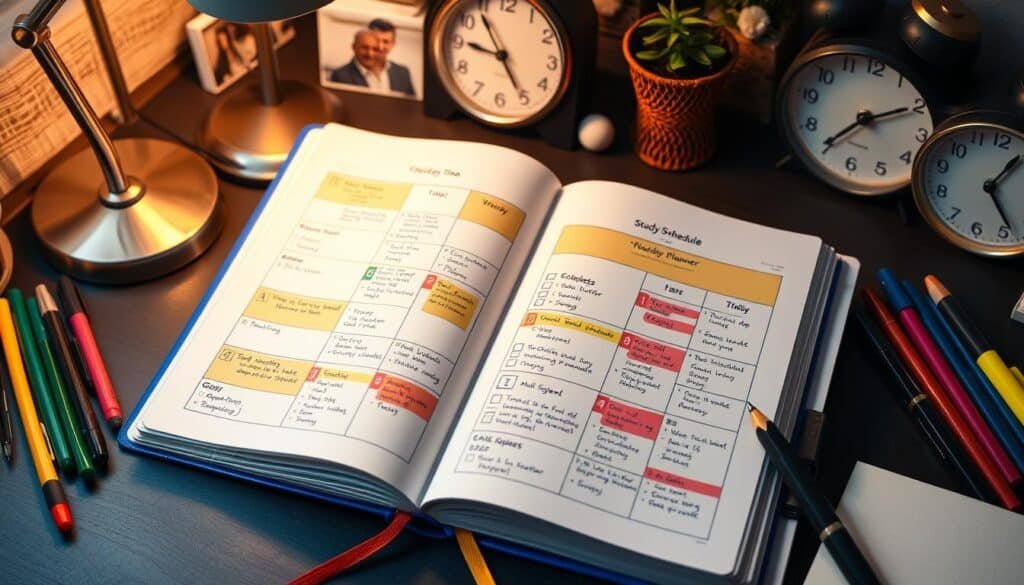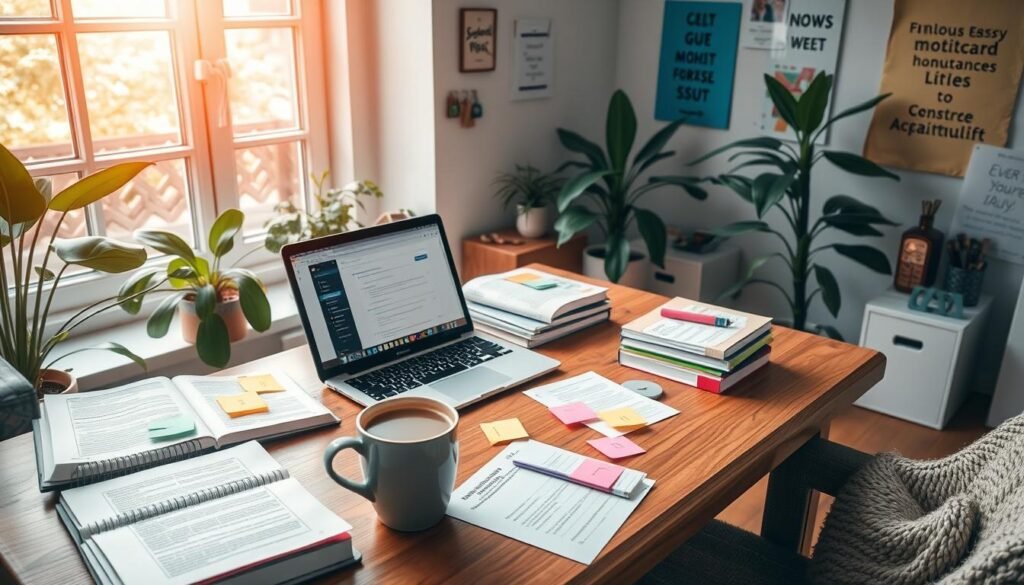Exam Preparation Tips For Students and big semester-end papers are tough parts of college life. There’s a lot to learn, organize, and remember before finals. But, the right study tips can make a big difference. They can help you feel less stressed and boost your GPA.
Also Read: The Ultimate Guide To The Best Study Techniques For Exams
First, figure out what kind of learner you are – visual, auditory, or kinesthetic. Then, try different learning methods to see what works best for you. It’s key to find what helps you absorb information the most.
Also, make sure to go to all your classes and take detailed notes. Joining study groups with classmates can also be a big help. And don’t forget to use your professors’ office hours for extra help.
Creating a solid study plan and sticking to it is also important. This way, you’ll stay on track and avoid last-minute stress. With these tips, you can do well in your exams and feel more confident.
Also Read: How Effective Are Mock Exams For SAT Preparation?
Key Takeaways
- Identify your learning style and experiment with different study techniques
- Attend all class sessions and take thorough notes
- Form study groups with classmates to support each other
- Utilize professors’ office hours for additional guidance
- Develop a structured study plan and schedule to stay organized
Develop Effective Study Habits
Creating good study habits is key for doing well in school. Make sure to go to all your classes and listen carefully to what your teachers say. This way, you can make the most of class time. It’s up to you to decide how you take notes, whether it’s in a notebook, on a computer, or a mix of both.
Also Read: How To Avoid Exam Stress?
Study with Classmates
Starting study groups with your friends is a great way to get ready for exams. Working together helps you learn better study techniques and study strategies. It also makes working on group projects easier and makes you feel more confident. It’s important to talk about what you’re studying and keep focused when you’re studying with others.
| Study Habit | Benefits |
|---|---|
| Attending Class | Gain a deeper understanding of course material, stay engaged, and make the most of class time. |
| Taking Notes | Organize information, identify key concepts, and reinforce learning. |
| Studying with Classmates | Collaborate, discuss ideas, and build confidence through group learning. |
“Studying with classmates not only helps me grasp the material better, but it’s also a great way to socialize and stay motivated.”
Prepare Well in Advance

Getting ready for exams means starting early and planning well. Trying to cram all your study into finals week can make you stressed and anxious. It’s better to break your study material into smaller topics and review them step by step. This way, you can really understand the information.
Also Read: How To Prepare For Final Exams?
It’s a good idea to spend two hours studying for every hour you’re in class. So, if you’re taking 15 credit hours a week, you should study for 30 hours outside class. By preparing early and sticking to a study schedule, you can dodge the stress of last-minute cramming.
The night before the exam, take a few minutes to jot down important ideas and concepts. This quick study session can help you remember key points and make you feel more confident for the test.
“Proper preparation prevents poor performance.” – Anonymous
Planning ahead and starting early are key to doing well in school. With a well-thought-out study plan, you can lower stress, remember information better, and do your best on exam day.
Also Read: Ace Your Exams: Best Study Tips For Exams
Stay Organized and Focused

Keeping your study area tidy and your mind clear is key to doing well in school. With a few easy tips, you can make your study time more efficient and productive.
Create Flashcards and Visual Aids
Creating flashcards and visual aids is a great way to stay on track. Flashcards help you remember important terms and concepts. Visual aids like mind maps, diagrams, and charts make complex ideas simpler.
Think about making outlines of your notes and readings too. Outlines help you spot the key points and organize them in a way that makes sense. This is super useful for big exams or tough subjects.
“Staying organized and focused is the key to academic success. By using tools like flashcards and visual aids, you can enhance your understanding and recall of important information.”
It’s important to find what study methods suit you best. Try out different ways and see what keeps you stay organized and stay focused in school.
Exam Preparation Tips For Students

Getting ready for exams can feel overwhelming, but with the right strategies, students can boost their confidence and do well. It’s important to know what the test will cover. For example, multiple-choice tests focus on definitions and concepts. Essay tests require a deeper grasp of the subject matter.
It’s crucial to talk to your professors about the exam format and structure. This helps students know what to focus on in their studies. Making practice exams can also be helpful. It lets them check their knowledge and see where they need to study more.
- Understand the exam format: Ask your professor about the test structure (multiple-choice, essay, etc.) to tailor your preparation accordingly.
- Create practice exams: Develop sample tests that closely resemble the actual exam to assess your understanding of the material.
- Attend review sessions: Take advantage of any pre-test review sessions offered by your professor or teaching assistant to gain valuable insights.
By following these tips, students can improve their chances of doing well and showing they know the course material. Practicing regularly, paying attention to details, and managing your time well are important. These skills help you overcome exam challenges and excel in your studies.
| Exam Type | Preparation Approach |
|---|---|
| Multiple Choice | Focus on definitions and concepts |
| Essay | Exhibit conceptual understanding of the material |
“Preparation is the key to success. The more you practice and understand the material, the better you’ll perform on the exam.”
Seek Academic Support

As a student, you might find some subjects hard or struggle with exam prep. Luckily, there are many ways to get help. Your professor is a great place to start. Visit them during office hours or send them emails to clear up any confusion and get tips for exams.
Teaching assistants are also there to help. They have office hours and can give you one-on-one help or lead study groups. And don’t forget about tutors. Most colleges have tutoring services for many subjects. These tutors can help you get better at tough topics and study smarter.
Using these academic support options can really change your grades. By getting help when you need it, you’ll understand your classes better, feel more confident, and reach your goals.
| Academic Support Service | Benefits |
|---|---|
| Professor Office Hours | Gain a deeper understanding of course concepts, receive guidance on exam preparation and essay writing |
| Teaching Assistant Support | Obtain one-on-one assistance, participate in small group study sessions, and clarify difficult topics |
| Campus Tutoring Services | Master challenging subject material, develop effective study habits, and improve overall academic performance |
“Seeking academic support is a sign of strength, not weakness. It demonstrates a commitment to your education and a willingness to take proactive steps towards success.”
Practice Self-Care

Keeping a balanced lifestyle is key to doing well in school. It’s easy to just study all the time, but ignoring your self-care can hurt your performance. Make sure to add these important habits to your study routine.
Maintain a Balanced Diet
Eating right helps keep your mind sharp. Don’t give in to junk food. Choose foods like fresh fruits, veggies, protein, and healthy fats instead. These foods will give you the energy and focus you need for exams.
Stay Hydrated
Drinking enough water is often forgotten but is crucial for your brain. Drink lots of water during the day to keep your body and mind working well. Being hydrated helps with focus, memory, and clear thinking.
- Carry a reusable water bottle with you and make a conscious effort to sip on it regularly.
- Avoid excessive caffeine and sugary drinks, which can lead to dehydration and crashes in energy levels.
By focusing on self-care like eating well and drinking enough water, you’ll be ready to do great on your exams with a clear mind.
“Take care of your body. It’s the only place you have to live.” – Jim Rohn
Also Read: CBEST Exam Registration: A Step By Step Guide
Conclusion
The secret to doing well in school is to learn how to study and prepare for exams well. Students should use class time wisely and study with friends to understand the material better. Getting ready early, staying organized, and using tools like flashcards also helps a lot.
Getting help from teachers, tutors, or campus services is key. It gives students the support they need to overcome hurdles. Also, eating right, drinking plenty of water, and managing stress are important for doing well in school.
By using these study tips, managing time well, and taking care of themselves, students can reach their goals. These strategies help students do their best and set them up for success in the long run.
FAQs
Q: What are the best study tips to create a study plan?
A: The best study tips for creating a study plan include setting clear learning objectives, organizing your study materials, and structuring your time to study effectively. Make sure to allocate specific times for different subjects and incorporate breaks to maintain focus.
Q: How can I organize my study space for effective exam preparation?
A: To organize your study space, ensure it is clutter-free and equipped with all necessary materials. A comfortable chair, good lighting, and a quiet environment can enhance concentration. Consider adding diagrams or visual aids to help retain information.
Q: What should I do on exam day to reduce stress and stay focused?
A: On exam day, it’s essential to manage your time effectively. Arrive at the exam location early, review the material lightly, and practice deep breathing to calm your nerves. Make sure you get a nutritious breakfast to fuel your brain.
Q: Can you explain the importance of taking breaks during study sessions?
A: Taking breaks is crucial as it helps to refresh your mind and improve focus. Short breaks can enhance productivity and prevent burnout, allowing you to retain information better and reinforce your learning when you return to studying.
Q: What are some active learning techniques I can use to prepare for my exams?
A: Effective active learning techniques include teaching others what you’ve learned, summarizing your notes, and testing your knowledge with past papers. Engaging with the material in these ways can reinforce your understanding and memory.
Q: How can I develop a study routine that works for me?
A: To develop a study routine that works, assess your strengths and weaknesses, and find a study method that aligns with your learning style. Experiment with different techniques, such as online study tools or group study sessions, to see what helps you retain information best.
Q: Why is it important to start early when preparing for an exam?
A: Starting early allows you more time to review the material thoroughly and reduces the stress of cramming. It gives you the opportunity to identify areas where you need additional resources and to reinforce your learning gradually.
Q: How can I effectively test my knowledge before the exam?
A: You can effectively test your knowledge by using practice exams, quizzes, and flashcards. Reviewing class notes and summarizing key concepts can also help reinforce the material and ensure you are well-prepared on exam day.
Q: What role do office hours play in exam preparation?
A: Office hours provide a valuable opportunity to clarify doubts and deepen your understanding of the material. Engaging with your instructors can help you identify learning objectives and areas where you need to focus your study efforts.
Source Links
- https://shorelight.com/student-stories/21-best-study-tips-for-final-exams/
- https://summer.harvard.edu/blog/14-tips-for-test-taking-success/
- https://www.topuniversities.com/student-info/health-and-support/exam-preparation-ten-study-tips





